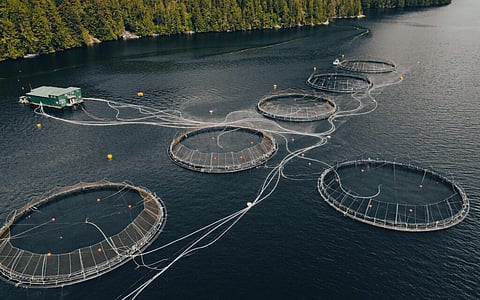

Kitasoo Xai'xais Nation holds six salmon farm tenures currently leased and operated by Mowi Canada West providing over 20 full-time, year-round jobs for community members.
Photo: Kitasoo Xai'xais Nation / Kitasoo Seafoods.
Deputy Chief Councillor of Kitasoo Xai'xais Nation, Isaiah Robinson, is the signatory of an open letter in which he replies to both the federal government and Wild First Canada, an organization opposed to open-net aquaculture in British Columbia (BC). In the text, he stresses that, in this debate, the focus should be on partnering with the Nations that manage fish farms in their territories and know their waters.
"We are committed to working collaboratively, but the focus should be on partnering with the Nations that know their waters, steward their resources, and have everything to lose if this industry — one that is rapidly improving — is unjustly dismantled," he writes.
"Meanwhile, other sectors that favour the wealthy and harm the environment continue to get chance after chance. They are given the luxury of time, while remote coastal communities like ours are put at risk for the sake of political showmanship," Robinson adds.
Earlier, the Deputy Chief Councillor of Kitasoo Xai'xais Nation wrote that it is remarkable that those who have never managed fish farms in their territories - "and have repeatedly declined our invitations to visit the Kitasoo Xai'xais fish farms" - now feel entitled to dictate the transition process.
"They haven't seen firsthand our innovation, technology, or the quality of our fish. These are not scientists or veterinarians; they are activists with a vendetta against fish farms, using them as a scapegoat to distract from real threats to wild salmon—issues like climate change, overfishing, and sport fishing, in which Wild First Canada founder Tony Allard has a vested interest," claims Isaiah Robinson.
This open letter is Kitasoo Xai'xais' response to Wild First Canada's call for independent oversight and removal of ocean-based salmon farms after considering that new license conditions for open-net pen salmon farming in BC leading up to the 2029 ban "do not effectively protect wild Pacific salmon."
The organization, which states on its website that its mission is "to support governments, communities and individuals working together to transition away from open net pen fish farms in the coastal waters of British Columbia," made that view public in an article in the local newspaper The Hill Times.
According to the Wild First Canada website, in it, Bob Chamberlin - First Nation Wild Salmon Alliance Chair - stated that "Opportunities to revisit and improve the conditions of licence [with First Nations] oversight [and monitoring] will be of the utmost importance."
"I don’t agree with Bob's stance that 'independent monitoring and oversight... will help the federal government in its goal of rebuilding trust in the science and decisionmaking'," says Robinson in his response.
"You know what will rebuild trust?" - he continues - "The government respecting our Rights and Title by keeping their hands out of our sovereign operations, our decision-making process, and our right to self-governance and self-determination."
"It's crucial to understand that 100% of the remaining fish farms in BC waters operate in partnership with First Nations, reflecting our stewardship and commitment to sustainable practices. Respecting these partnerships is the only way the government will earn the trust of the coastal First Nations who have chosen to enact their sovereignty through responsible aquaculture in our unceded territories," Deputy Chief Councillor of Kitasoo Xai'xais Nation highlights.
This is not the first time that the Kitasoo Xai'xai First Nation has approached Canada's government to express its opinion and claim sovereignty over its territorial waters. At the end of May, when the federal government had not yet communicated its final decision on the future of open net-pen salmon aquaculture in BC - it announced its ban at the end of June - Isaiah Robinson himself addressed a letter to Justin Trudeau urging him to renew salmon farming licenses.
In it, Robinson asserted that Kitasoo Xai'xais Nation is at risk without salmon farming, and called on the Prime Minister of Canada to act with respect for his Rights and Titles of Authority to decide the future of salmon farming in its traditional territory.
A position that has always been advocated by the BC Coalition of First Nations for Finfish Stewardship (FNFFS) - of which Kitasoo Xai'xais is a member - as well as the BC Salmon Farmers Association, which has long advocated for an indigenous-led transition plan.
